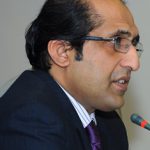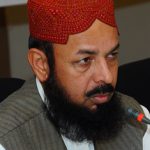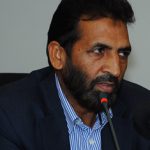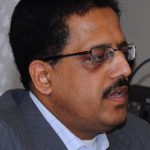The federal and provincial governments should take immediate steps required to implement the Article 25-A of the Constitution which ensures the free and compulsory education to all children of the age of five to sixteen years. Also, there is need for establishing a national commission comprising members from all segments of society to formulate a unanimous national policy on education. As far as increased demand for education is concerned, Islamic magazines, newspapers and journals can play a vital role to create awareness among people about importance of education. These views were expressed by leading scholars, editors and columnists of religious magazines and journals in a seminar titled “Educational rights and obligations: constitutional and religious perspectives,” jointly organized by Pak Institute for Peace Studies (PIPS) and Alif Ailaan on December 10 in Islamabad.
In his welcome remarks at the start of the inaugural session, director PIPS  Muhammad Amir Rana and director of education campaign at Alif Ailaan Musharraf Zaidi explained the objectives of the day-long discussion. “How we can achieve the basic right of education and what role the Islamic periodicals can play in promotion of education in the country is the main task of today’s seminar,” Mr. Rana said.
Muhammad Amir Rana and director of education campaign at Alif Ailaan Musharraf Zaidi explained the objectives of the day-long discussion. “How we can achieve the basic right of education and what role the Islamic periodicals can play in promotion of education in the country is the main task of today’s seminar,” Mr. Rana said.
 Musharraf Zaidi added that the education should be the aim of our political and religious parties and it should be linked to our political system. ”Editors and columnists of Islamic periodicals can influence the government and the parliamentarian to do efforts for the improvement of education in the country”, he stated.
Musharraf Zaidi added that the education should be the aim of our political and religious parties and it should be linked to our political system. ”Editors and columnists of Islamic periodicals can influence the government and the parliamentarian to do efforts for the improvement of education in the country”, he stated.
 Director ISAPS Ahmed Ali discussed at length the importance of Article 25-A besides hinting at some flaws in the article. He said it is the responsibility of the provincial governments as well as the federal government to immediately take the required administrative and legislative measures to implement the article in its true spirit.
Director ISAPS Ahmed Ali discussed at length the importance of Article 25-A besides hinting at some flaws in the article. He said it is the responsibility of the provincial governments as well as the federal government to immediately take the required administrative and legislative measures to implement the article in its true spirit.
Deliberating upon the topic of “Educational prosperity: constitutional perspective and our responsibilities” during the first session, the speakers stressed upon the government to increase the educational budget to at least 5% of the GDP.
 Director Sheikh Zayed Islamic Centre at University of Karachi and editor of monthly Fiqh-e-Islami Dr. Noor Ahmed Shahtaz emphasized that religious scholars and media persons should write letters to members of national and provincial assemblies so that they pay attention to the matter effectively.
Director Sheikh Zayed Islamic Centre at University of Karachi and editor of monthly Fiqh-e-Islami Dr. Noor Ahmed Shahtaz emphasized that religious scholars and media persons should write letters to members of national and provincial assemblies so that they pay attention to the matter effectively.
 Zia-ul-Haq Naqshbandi, editor of Fikr-e-Momin, talked about the role of provincial governments in educational policy and said that after the approval of 18th amendment and abolition of the concurrent lists, the provision of education has become the responsibility of provincial governments. Describing the poor condition of schools, he said that in Punjab, which is relatively better off than other provinces, more than 80,000 schools are run without teachers, and parents do not send their children (especially girls) to schools in rural areas due to unavailability of washrooms.
Zia-ul-Haq Naqshbandi, editor of Fikr-e-Momin, talked about the role of provincial governments in educational policy and said that after the approval of 18th amendment and abolition of the concurrent lists, the provision of education has become the responsibility of provincial governments. Describing the poor condition of schools, he said that in Punjab, which is relatively better off than other provinces, more than 80,000 schools are run without teachers, and parents do not send their children (especially girls) to schools in rural areas due to unavailability of washrooms.
 Khalid Mahmood Abbasi, columnist and representative of monthly Mesaaq, said that our education should help students achieve some broader objectives other than getting a degree. He further stressed that our education system should be unanimous at least on the matriculation level.
Khalid Mahmood Abbasi, columnist and representative of monthly Mesaaq, said that our education should help students achieve some broader objectives other than getting a degree. He further stressed that our education system should be unanimous at least on the matriculation level.
 Tariq Mehmood, editor of weekly Asia, suggested there is need to establish a national educational commission on federal level comprising educational experts from all educational system to formulate a unanimous educational policy for Pakistan.
Tariq Mehmood, editor of weekly Asia, suggested there is need to establish a national educational commission on federal level comprising educational experts from all educational system to formulate a unanimous educational policy for Pakistan.
 Khalid Sial, columnist and editor of monthly Shahadat, pointed out that the education policy is not even discussed in political gatherings. He said that it is the responsibility of our ulema (religious scholars) and other organizations associated with them to devise educational policies and put forward the recommendations to the government institutions.
Khalid Sial, columnist and editor of monthly Shahadat, pointed out that the education policy is not even discussed in political gatherings. He said that it is the responsibility of our ulema (religious scholars) and other organizations associated with them to devise educational policies and put forward the recommendations to the government institutions.
The importance of education and the role of a teacher in the light of religion was the topic focused in the second session. Khurshid Nadeem, religious scholar and columnist, said that the religion of Islam gives us the guidelines for every aspect of life and same is the case of education. He underlined that there is need to create links between the religious and secular segments. He pointed out that the ruined system of social values in Pakistan needs to be revitalized.
 Ghulam Baqir Ghilon, editor of monthly Al-Muntazir, highlighted that the glory and importance of education should be conveyed to the people to promote education in the society. Talking about the role of a teacher, he said the teacher should focus on every single child in the class and should be kind towards his students.
Ghulam Baqir Ghilon, editor of monthly Al-Muntazir, highlighted that the glory and importance of education should be conveyed to the people to promote education in the society. Talking about the role of a teacher, he said the teacher should focus on every single child in the class and should be kind towards his students.
 Raza-ud-Din Siddiqui, religious scholar and a columnist for daily Nawa-e-Waqt, stated that the students should at least be enough trained to know how they become beneficial for the society with the use of acquired education. He said it is important for the madrassa students to take formal education according to the requirement of the society along with religious education if they wish to lead the people.
Raza-ud-Din Siddiqui, religious scholar and a columnist for daily Nawa-e-Waqt, stated that the students should at least be enough trained to know how they become beneficial for the society with the use of acquired education. He said it is important for the madrassa students to take formal education according to the requirement of the society along with religious education if they wish to lead the people.
 Arif Bahar, senior journalist and a columnist for weekly Friday Special, said that a society that does not focus on education or does not recognize the important of education cannot be considered civilized. He said that the media, being a very strong pillar of the state, can promote education effectively but it has become commercialized.
Arif Bahar, senior journalist and a columnist for weekly Friday Special, said that a society that does not focus on education or does not recognize the important of education cannot be considered civilized. He said that the media, being a very strong pillar of the state, can promote education effectively but it has become commercialized.
 Mufti Sana-Ullah, educationist and columnist from Balochistan, said that the status of a teacher is remarkable in Islam and it is important for a teacher to realize his status.
Mufti Sana-Ullah, educationist and columnist from Balochistan, said that the status of a teacher is remarkable in Islam and it is important for a teacher to realize his status.
Maulana Ammar Khan Nasir, deputy editor of monthly Al-Sharia, Gujranwala, said that the Islamic  media and religious community need to initiate a movement that creates awareness about education. He further stressed the need for the collective discussions and dialogues that bring forth an opportunity for experts to give their opinion on the issue and recommendations over time.
media and religious community need to initiate a movement that creates awareness about education. He further stressed the need for the collective discussions and dialogues that bring forth an opportunity for experts to give their opinion on the issue and recommendations over time.
At the end of the session, the participants recommended:
- The religious scholars should use their influence among society to create awareness about the importance of education and “Khateebs” should deliver at least one sermon of Friday prayers per month on education.
- The civil society needs to make media effective to eradicate the educational crisis.
- Every literate man should teach at least one illiterate person because the country is facing the problem of illiteracy. This would generate a new wave of educational prosperity.
- The editors of religious journals and magazines should incorporate at least one essay regarding education in every edition.
- There is need for communication among different educational institutions so that a unanimous strategy could be made pertaining to educational crisis.
- There should be an effective check and balance system on the people linked with educational institutions or departments.
- At present 2% of the budget is allocated for education, it should be increased to at least 5% of GDP.
Maulana Irfan-ul-Haq Haqqani, editor monthly Al-Haq, Maulana Mehbub-ur-Rehman, vice editor monthly Zia-e-Haram, Dr. Ali Akbar Al-Azhari, editor monthly Minhaj-ul-Quran, Sabookh Syed, columnist and journalist, Nawaz Kharal, member advisory council, monthly Daleel-e-Rah, Maulana Muhammad Azher, editor monthly Al-Khair, Younis Qasmi, editor monthly Khilafat-e-Rashida, Maulana Ismail Rehan, columnist daily Islam, Maulana Abdul Jabbar Nasir, columnist daily Islam, also participated in the seminar.

